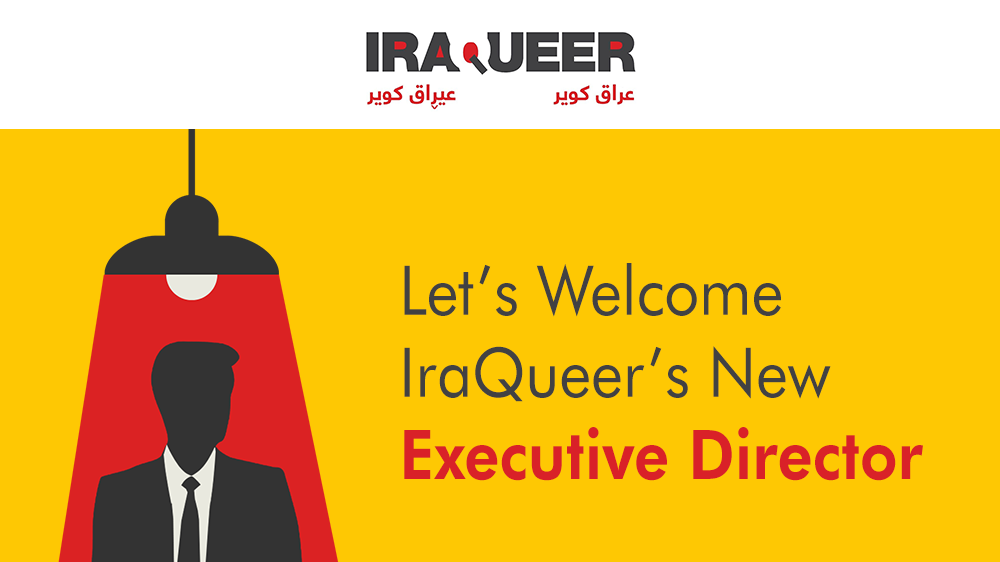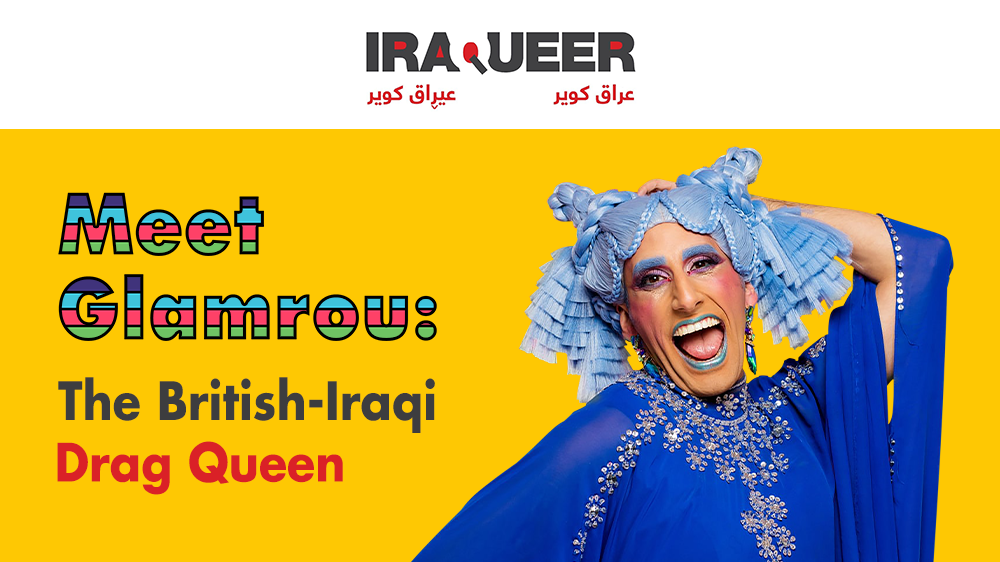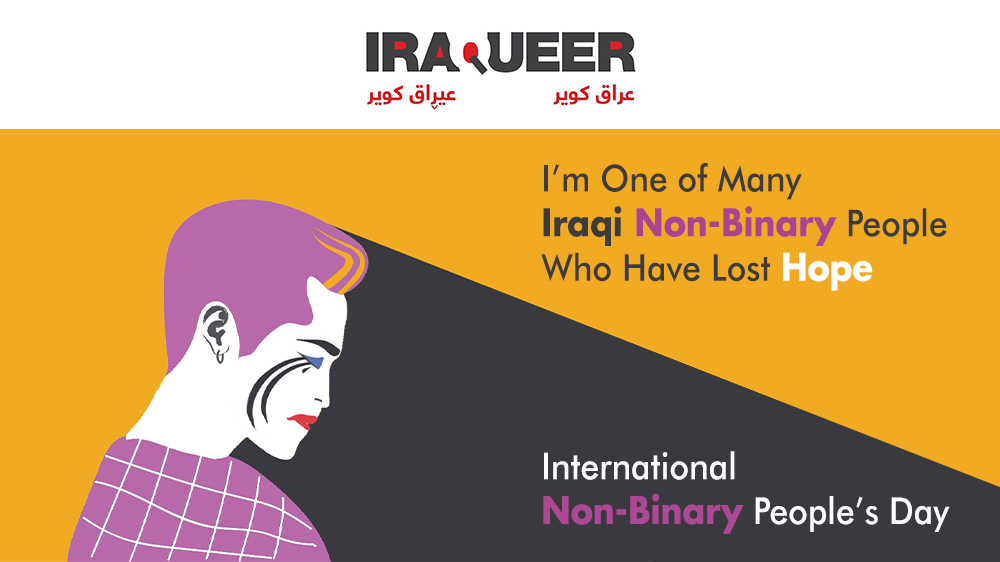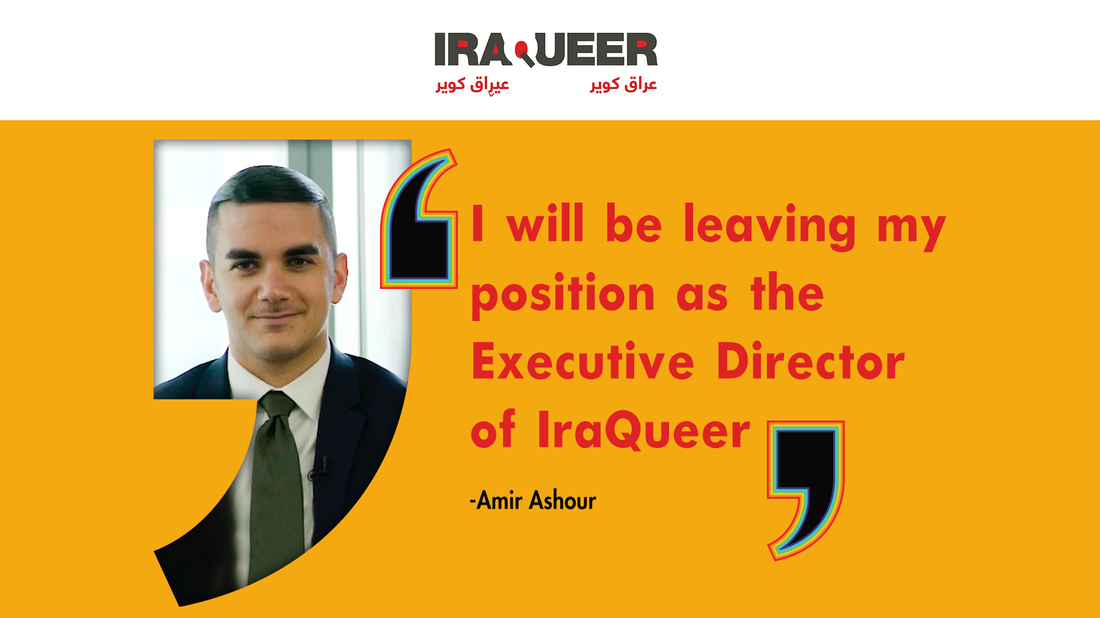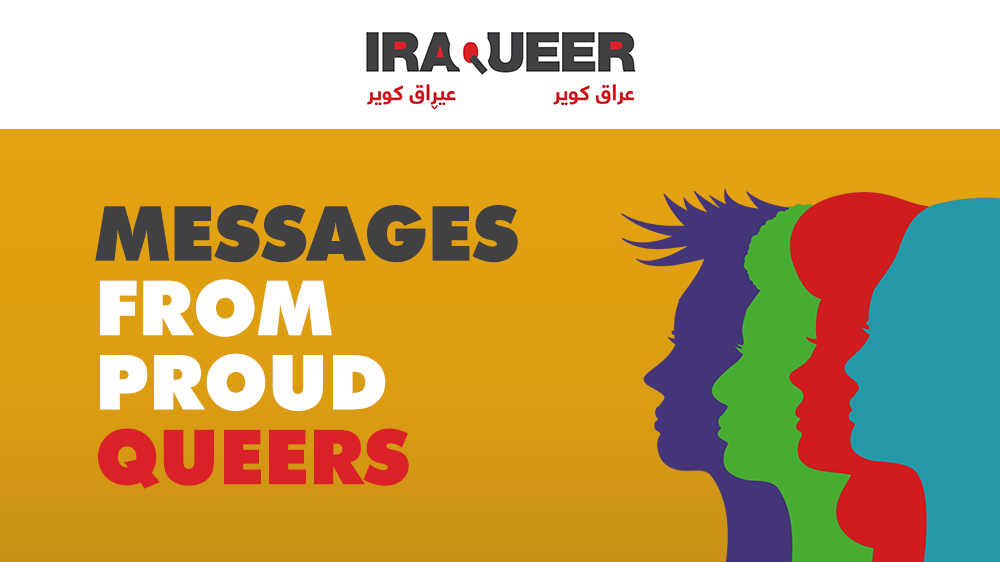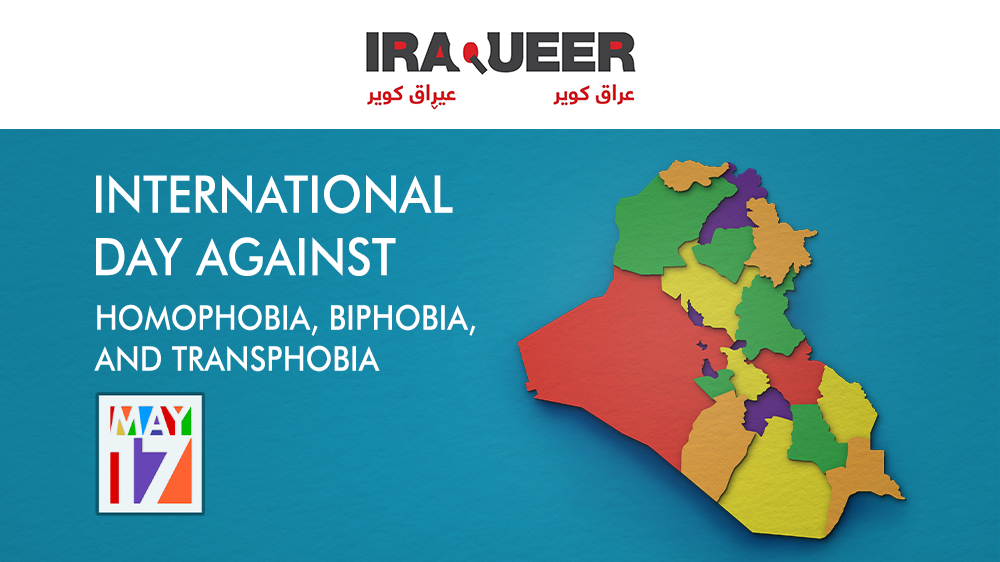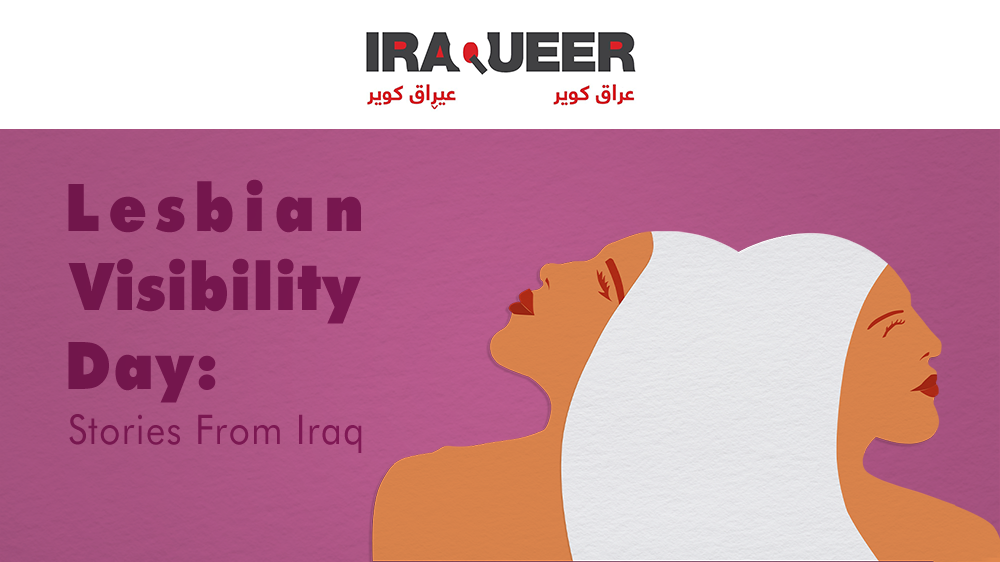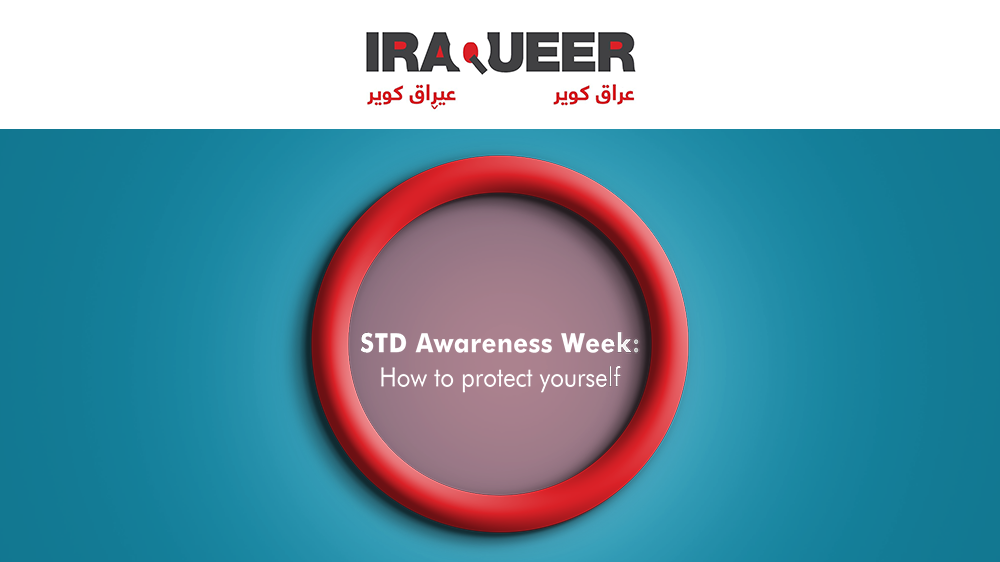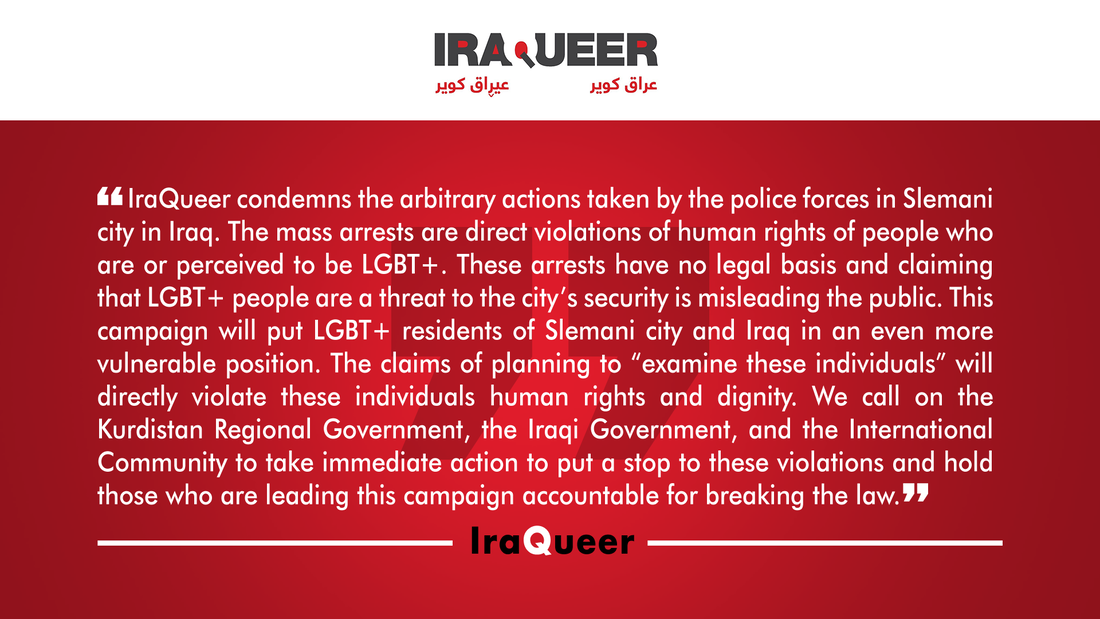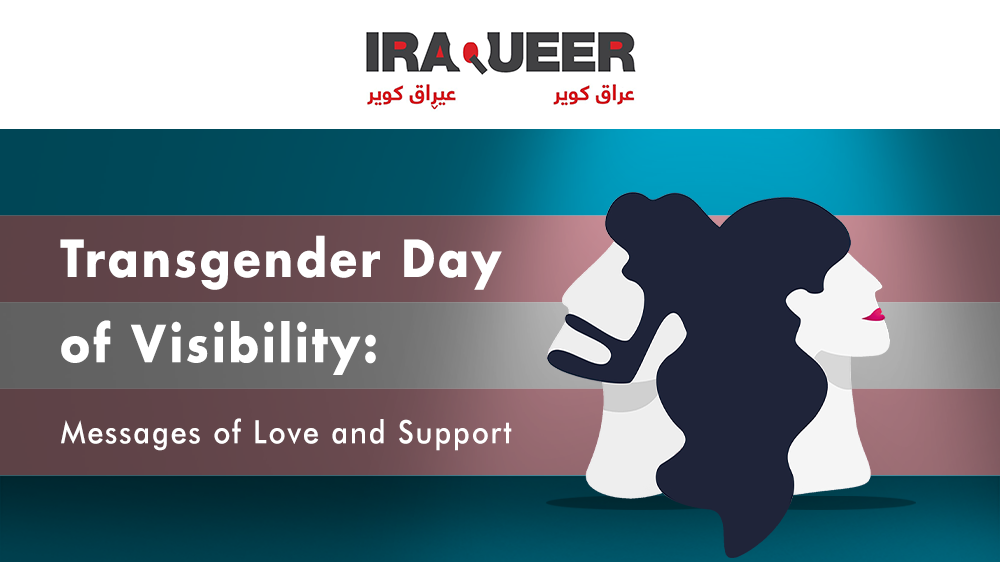|
IraQueer is excited to announce the appointment of a new board consisting of seven LGBT+ Iraqis. The appointment of this board marks a historic milestone for IraQueer and the larger queer movement in Iraq as it’s the first publicly known organization to have a board consisting of only LGBT+ Iraqis.
The new board, which includes IraQueer’s founder, has members representing different parts of Iraq and different identities within the LGBT+ community. They bring with them a wide range of experiences as they work in different sectors including nonprofits and humanitarian organizations, education, and finance. Most members of the board have chosen to stay anonymous for the time being giving the security risks that come with being public. However, this choice will not impact their ability to serve the organization and the wider LGBT+ community in Iraq. In fact, all board members are determined to use all their connections and resources to empower the organization and the LGBT+ community in Iraq. One board member said “I joined IraQueer because I found a community where I can be myself, create bonds, and learn from similar experiences. I want the world to know that we exist and that we’ll always resist. I want to keep supporting IraQueer until we have an office in every Iraqi city.” Another board member said “I joined because I believe that everyone deserves to love, be loved, and respected for who they are. Everyone deserves to be free without and live without fear. We at IraQueer believe in a safer Iraq for all citizens regardless of their sexual orientation or/and gender expression.” She continued to highlight the impact of IraQueer’s work and her hopes for the future; “I hope that we can create a safer place for LGBT+ citizens. We will support and advocate for them until LGBT+ Iraqis are recognized as equals, and I know the future is going to be better for us.” For the next three years, members of the board are eager to work with IraQueer’s new Executive Director and the rest of the team to not only support IraQueer in continuing the work we’ve been doing for nearly seven years, but to also take it to the next level and continuing to push for a future in Iraq where the right of LGBT+ citizens are protected.
2 Comments
The 31-year-old non-binary British-Iraqi, Amrou Al-Kadhi tells their story of being a drag queen that originally comes from an Arab and Islamic background. Amrou, who uses Glamrou as their drag name, has been doing drag shows since 2016 and they’re here to talk about their childhood and the obstacles they’ve been through to finally reach a place where they feel happy and empowered.
Amrou says, “During my childhood, I lived between Bahrain and Dubai till I was 11. For the most part, my experience in the Middle East was great – I loved the cultural emphasis on family, and my house was always full with relatives and noise. Always big family lunches and dinners, and the focus on respecting your elders was really important and it was something that made me feel very warm and safe whilst I was growing up. Unfortunately, I don’t see as much of an emphasis on taking care of your family in the UK (especially with the elderly). While living in the Middle East, I did have some negative experiences – particularly when Islam class started warning me about the hellish consequences of homosexuality, which made me very scared about who I was; in Islam, there is a lot of “sin-counting,” and once I started realizing I was different, I developed OCD because I was so worried about the sins I was accumulating. So yes, my mental health deteriorated quite quickly during that time. Living in the Middle East had an impact on my way of thinking about my sexuality. I was obviously very young when I was in the Middle East, but to be honest, there was so little representation or discussion about queer lives, that I didn’t really have the language or conception of it. I think that added to my fear because I wasn’t even sure my experiences were valid or were allowed to exist, and that kind of made me feel invisible. At an early age, Allah was a source of unconditional support and love; I really believed they loved me no matter what, and this was very comforting. When I started to learn about hell, and the terrifying consequences of sin, I became less comforted by Allah, and much more terrified. Allah sort of took the form of a patriarchal dictator rather than a source of maternal comfort. When it comes to the relationship with my family and specifically my mother, I have to say that she is one of the most hilarious people I have ever known. Despite being strict and conservative, she lives for social performance and treats every social occasion like a night at the Met Gala. Before my sexuality became an issue in the family, I would help mama get dressed and we had a kind of secret bond based on a revelry of femininity. In many ways, she was the beginning of my love of drag. So my drag character, Glamrou, is very much an homage to the mother I loved and cherished before things got complicated. She had a pretty horrendous reaction to my sexuality and gender identity during my teenage years, which has left deep emotional scars, and I am still working through those. But I don’t hold a grudge. She is a victim of her own circumstances, and she was doing what she thought she needed to do to protect me from the judgment of the community, even if she went about this in terrible ways. After all I’ve been through, my journey of healing and self-acceptance started in my late 20s. I had been a drag queen for about 6 years at this point, but my drag was very much a façade and a front – like I was telling the world that I was fine and completely proud and in charge of my queer identity, when in fact I still harbored a lot of shame and trauma from my childhood. It was only during a show at the age of 27, when I started using drag to explore my vulnerabilities and my trauma on stage that I was able to process them and heal. In a way, my drag had to become much more honest for this to happen. And I remember that my first drag show was a hot mess. I had no idea what I was doing, and I rented out a crypt at university to do it. I looked terrible and I was petrified. But the second I went on stage, I found a confidence I never knew I had in me. I receive criticism and I get threats from white supremacists who hate the fact that I make fun of British culture in my shows, transphobes continually spew hate at me, and I get threats from conservative Muslims who hate the fact that I sing to Allah during my performances. But mostly, I get love from the people who come to support me, and that’s what I hold on to. The love does drown out the hate. Regardless of all the hatred, I keep doing what I love and for that I wrote my book “Unicorn”. The book is a memoir exploring reconciling being queer and Muslim, particularly trying to make sense of the relationship with my mother. I wrote the book so that other queer Arabs could have somewhere to see themselves and process their own feelings, as well as a way in which to process my own trauma and move beyond it. My message to Iraqi queers who are dealing with hatred is to remember that whatever people will try and make you believe, understand that it’s not your fault. Allah loves you as you are, and your chosen family is out there, waiting for you.” Get to know Glamrou by following them on Instagram and Twitter WARNING: CONTAIN MENTION OF SUICIDE, SELF-HARM AND BLOOD.
Non-binary is a term that’s easy to understand, yet not enough people seem to have any idea of what it’s. As a kid, you might have asked your parents about what it means to be a “woman” or a “man” and their answer was likely to be as follows, “when a mother gives birth to a baby, the doctor looks at the newborn’s body and decides the baby’s sex. If the sex was female, we give that baby a “she/her” pronouns and if the sex was male, we give that baby a “he/him” pronouns”. Well, that’s kind of not true because someone’s gender can’t be decided based on their sex. Gender is a wide spectrum that includes many identities and people might fall under any of them or none of them based on their internal feeling of who they’re. Keep in mind that your parents, your doctor, or your friends don’t have the right to decide it for you. Some kids might grow to use the same pronouns that was assigned to them at birth while others might feel the need to change it and that brings us to the term “non-binary”. Non-binary people don’t fit into the categories of “woman” or “man”, “female” or “male” and for that, they get to decide on their pronouns based on how they feel on the inside. As we all know, women use the pronouns “she/her” while men use the pronouns “he/him” but WHAT ABOUT NON-BINARY PEOPLE? Well, while some non-binary individuals choose to use the pronouns “they/them”, there’re still ones who use “she/her” or “he/him” and others who might choose some other pronouns like xe, ze, sie, and so on. Just like non-binary people get to decide the pronouns that fits them the most, they also get to decide on how to express their gender identity through their clothes and behavior. Non-binary people are allowed to express their gender identity the way that suits them and gives them the most comfort. And other people around them should learn to considerate and respectful. While people in some countries around the world have enough knowledge about non-binary, people in Iraq continue to use only the two common pronouns which are “she/her” and “he/him”. Here in Iraq, people’s pronouns get decided early at birth and continue to be used until the day they die. There’s not any consideration given to non-binary people and that could lead them to feel odd. As an Iraqi who’s trying to support non-binary Iraqis, learn to ask everyone new you meet for their pronouns instead of guessing it because you really never know what a person feels inside. In the beginning, it might seem confusing to learn people’s pronouns and you might make some mistakes here and there but what matters is that you keep trying. A lot of Iraqi non-binary people have bad experiences that they need to talk about and Noor is one of them. Noor is a fourteen-year-old non-binary individual who uses the pronouns “she/her”. Noor never felt that he/him, which was the pronouns assigned to her at birth, was the right pronouns. She says, “”He/him” pronouns is used to refer to me by everybody but it never seemed the right pronouns. Eventually, I started using “she/her” pronouns which I found to be the most appropriate. If someone asks me what non-binary is, I would say it’s the way you feel inside about yourself that doesn’t consider the standards of society or the gender roles that are set to control people. Simply, being non-binary means having the freedom of choosing yourself. Personally, I care a lot about fashion so what I wear is affected by that more than it’s affected by my gender identity. It doesn’t matter to me whether what I wear tends to be more feminine or masculine. The most important thing to me is to look beautiful. I love makeup too! But I need to be too careful when putting any on my face. I only wear it in my room late at night when my family is asleep and I need to take it off before I go to bed. I put some when I go to places that are full of queer people, like parties and so. And there was only one time when I had makeup on my face while I was out in a public place and that was the same day I tried to commit suicide. Sadly, my family isn’t supportive! We’re always arguing and these arguments might turn into something really bad. Sometimes, they see my outfit, which they consider inappropriate to be worn in our Iraqi society, and they react in extremely rude and harsh ways. These arguments usually end up with physical assault, swearing, and grounding. Unfortunately, it’s not any better outside my household. I get harassed in many different ways, by strangers in malls and parks and public places and even school. I tried talking to my mother about sexuality in general and about my identity in particular but her reaction was too bad. She got mad and told my father and many problems happened so I never discussed the topic with any of them after that. Unfortunately, talking to a therapist hasn’t been in any way better than talking to my parents. I’ve been going to a therapist behind my parent’s back! The bad news is that even my therapist turned to be homophobic and that means she can’t be someone I can talk honestly with about my identity. Not being accepted by others my age at school, struggling to wear what I want, and dealing with constant harassment made me lose my will to live and made me wish I was different than who I’m. It has been five months since my first attempt to commit suicide and only few weeks since my last attempt. I tried to hang myself multiple times but every time I did that, I ended up waking in a hospital. In my last attempt, I tried to cut my wrist but also woke up at the hospital surrounded by family members. I lost a lot of blood that day so it took me a while to get better! And when I did get better, my family members started threatening to kick me out if I did anything similar again. The situation is quite bad but I keep hoping that things get better one way or another and that I can wake up in a better place with better people who understand me and love me for who I’m.” Rand IraQueer After nearly seven years, I will be leaving my position as the Executive Director of IraQueer. Starting IraQueer and leading it has been the greatest honor of my life. Together with my colleagues, we have managed to create resources for queer Iraqis that never existed before us. We have provided medical and legal services, and offered safe housing for hundreds of people who needed them. We have produced radio programs talking about LGBT+ rights and queer people that reached hundreds of thousands of Iraqis. And we have lobbied world leaders to put pressure on Iraq to recognize human rights of LGBT+ Iraqis. Lobby efforts that led to the Iraqi government recognizing the right to life for all citizens regardless of their sexual orientation and/or gender identity in front of the international community. While I will be leaving my current position, I will not be fully leaving IraQueer. I will join six other brilliant LGBT+ Iraqis to sit on the board! Together, we are determined to provide the team with all the support we can give to make sure that they are able to continue their groundbreaking work.
In addition to the new board, IraQueer will have a new Executive Director. The new director who chose to stay anonymous for the time being, brings years of experience with him and is keen to take IraQueer’s work to the next level. Together with the rest of the team, they are determined to continue advocating on behalf of LGBT+ Iraqis. The historic milestones that we reached at IraQueer wouldn’t have been possible without all the people who contributed to and supported the organization. All the volunteers and queer Iraqis who believed in us. All the partners and allies who used their resources and expertise to develop our movement. And most importantly, my colleagues at IraQueer, the young queer activists who risk their lives to defend LGBT+ Iraqis and their rights. It’s been the highlight of my career to work with and learn from you all. - Amir Ashour Pride Month happens in June of every year and is considered a great opportunity for queers all around the world to organize different events to spread awareness about the discrimination the LGBT+ community faces and to remember how much impact the community has on the world. During the month, many NGOs that fight for human rights, allies, and queers themselves share an enormous amount of information about what it’s like to be queer plus stories from the community on different social media platforms and websites that could be accessed by everyone.
Kareem, Marselen, and Sara are three Iraqi queers who share their stories with us and talk about what Pride Month means to them: “Learning how to accept myself as a queer has allowed me to accept other people’s differences” -Kareem, 23 year old queer man, Najaf city. Kareem says, “Understanding my sexuality and learning about the LGBT+ community has helped me surround myself with more people from the community and allies who have been giving me enough confidence to be myself. I can say that my circle of friends has changed a lot since the time I came out and since I started showing my support to the community. Being myself meant losing some friends who were not supportive while gaining better friends from the community who let me express my sexuality comfortably. And when it comes to Pride Month, the thing I love the most about it is how much attention the community gets! The whole world talks about us and we get the chance to educate others and spread love and awareness. And as part of the community, I say that with or without the support of the society, we will continue existing and fighting and we will not stop until we put an end to all this injustice and suppression.” “Everyone deserves to be loved! And whether that love comes from someone from the same sex or the opposite sex, this shouldn’t be a problem or a threat to anybody.” -Marselen, 20 year old lesbian. “Since the day I figured out my sexuality, I’ve been careful when choosing the ones I tell about it because I understand that some people could show a lot of hatred once they know you’re different than them. I try to keep the list of people I tell too short and I always choose the ones who are open-minded and supportive! But still, with all that, I’ve lost some friends when they knew I support the LGBT+ community. But regardless of whether people describe same-sex love as a dirty thing or a mental illness and regardless of all the hatred, I believe that everyone deserves to be valued and loved for who they are. And to me, every month of the year feels like Pride Month because I’m always proud to be part of the LGBT+ community. Still, I know how many changes could happen by celebrating it every year. Pride Month is important because it’s a memorial month of all the queers who got killed or tortured or took their own lives because of the hatred they had to deal with. But let us not forgot that when it comes to being an Iraqi queer, Iraq is not a safe place for us so my advice to all of you as members of the community is to be careful who to tell about your sexuality. You as queers don’t need to be out to be considered valid so don’t push yourselves to tell people who might end up causing you pain. And remember that you are not hiding your identity because you are doing something wrong but because you are living in a place whose people lack the proper knowledge to accept you. Love yourselves as you are, always support each other, and be safe.” “Realizing I’m pansexual has not changed me as a person but it definitely has made me more conscious after realizing that not everybody around me is supportive or understanding” -Sara, 20 year old pansexual, Erbil “Since the time I became honest about my sexuality with others, I lost a bunch of friends at once and I suffered from both mental and physical abuse. I’ve indeed lost them, but I got the chance to meet new people from the community and allies who love me and accept me for who I’m. And all I can say is that being queer, especially in a country like Iraq, has its ups and downs. Unfortunately, Pride Month is something I have not personally witnessed or experienced but I know how important celebrating it is to remember the people who fought and suffered to get even a little bit of recognition from the world and others who died protesting for our rights and I have nothing but utter respect for all of them and I hope that we get more recognition in the years to come. Until I get the chance to celebrate Pride Month, I’ll try my best to enjoy it online. I’m connected with queer people from many countries around the world who share stories and pictures with me of the events they attend during this month and I hope that one day I’ll get the chance to be with them. Meanwhile and until all Iraqis get the opportunity to celebrate it the way they love, I tell everyone from the community not to give up on who they are and to try their best to ignore hatred. One day we’ll find support and love within this society or outside.” On the 17th of May, 1990, the World Health Organization (WHO) stated that homosexuality was no longer considered a mental disorder after years of classifying it as one and after years of violence against the LGBT+ community. Starting on the 17th of May, 2005, many countries around the world celebrated the day which was first recognized as the “International Day Against Homophobia”. Later, both “transphobia” and “biphobia” were added to the title of the day name and people started referring to it with the acronym “IDAHOBIT” The 17th of every May is an important date for hundreds of people because they get to use the day to raise awareness on the discrimination and violence that bisexuals, gays, lesbians, and transgender people experience on a daily basis. How Did It Go In Iraq? International Day Against Homophobia, Transphobia, and Biphobia has been celebrated in Iraq before and it didn’t go so well. On the 17th of May, 2020, in the capital city of Iraq, Baghdad, the Canadian, UK, and European Union embassies raised the rainbow flag to celebrate this special day. It didn’t take too long until the news was spread everywhere and everyone was commenting on what happened. Different news channels and social medial platforms were busy with what the embassies did. Some people were happy and proud while the majority totally rejected such a behavior. Based on Alex MacDonald report on Middle East Eye, not a long time after raising the rainbow flag, Iraqi politicians expressed their disapproval of such actions by describing homosexuality as a “mental illness” or by explaining that Iraq is against the concept of homosexuality even if the Iraqi law doesn’t consider it illegal. “On Sunday evening, the Iraqi Foreign Ministry issued a statement saying that homosexuality went against “the noble morals of all divine religions" and said all missions in Iraq had to "adhere by the laws of the country and to follow diplomatic norms."” Iraq remains on the list of homophobic countries and remains a dangerous place for LGBT+ people to live in or visit. Threats follow LGBT+ Iraqis everywhere inside the country! They could lose their lives, freedom, or homes if the wrong people knew about their sexualities. It’s not only about the laws of Iraq or the homophobic politicians! The problem is bigger than that and it lies in the way that Iraqi families define and judge homosexuality. Iraq is mainly controlled by traditions and religion while the law doesn’t have much to say about the discrimination the community faces and that raises the question of what families are allowed to do to their kids if they turned to be homosexuals, bisexuals, or transgender? And what would the Iraqi government do if any cases of murder or violence happen against these LGBT+ individuals? The majority of Iraqi families are supported by tribes ('ashira) and there are tens of different tribes in Iraq that have their own rules to guarantee that their beliefs keep passing from one generation to the other. These tribes, in some Iraqi territories more than the others, have more power than the government which means they get to decide on how a person from the community gets punished. Some might get killed while others might be forced to get married. And the stories differ from one tribe to another. We can say that homophobia, transphobia, and biphobia exist in all these tribes and that makes violence against LGBT+ people so common and normal. No wonder that the number of homophobes is still high in Iraq! Children who are still only a few years old find it fun to make silly jokes about homosexuals or transgenders. Usually, parents teach their kids to be homophobic and to express their hatred in the ugliest ways possible. The whole matter of killing or threatening people just because they identify as LGBT+ isn’t seen as a mistake. Kids are taught from an early age to hate everything that they find unfamiliar and that hatred grows with them until they get to an age where they are able to express it with both bullying and violence. And here in a country like Iraq, the problem is this bad because there’s no one to stop the homophobes. From one side, the government doesn’t provide any protection to the LGBT+ community and from the other side, families that have a tribe’s support can do what they want to the ones who stand against their tribal traditions and therefore can express their hatred freely without any consequences. Rand IraQueer Today we celebrate Lesbian Visibility Day! Which is a great opportunity to put the light on all women from the LGBT+ community who are sexually and/or romantically attracted to other women. Despite all of your suffering as an Iraqi lesbian, we tell you to stay strong, to be proud, and to not ever listen to what haters say. You don’t have only one day to celebrate being a lesbian, every day is a chance for you to celebrate and to be proud.
For this day, Esraa and Khawla, who are two Iraqi lesbians, share their happy and sad stories with us: Esraa says, “Ever since I was a kid, I dreamt of being an actress. Coming from an artistic family that loved the theater and music meant that my family were supportive of my dream to go to theater school. To me, it was one of the few ways that I could express myself freely. I enrolled at the age of eight. I grow up in the theater and had a great childhood! I learned early on about myself because I was allowed to express different things in my identity, and my family were supportive. When I turned 16, a new girl joined the program for a summer. We became friends very quickly. She was beautiful. Time went by, and we got closer. I started feeling attracted to her! I did not fully understand what those feelings meant, so I told my parents. Both of them asked me to keep this to myself as it could put me and them in danger. They did not reject it, and helped me understand what it meant. So I took their advice and did not tell the girl that I liked her. We continued being friends even after she left the acting class. We started seeing each other outside in coffee shops and went shopping together. I felt like she was also developing feelings towards me but I did not say anything because I was too scared. Until one day we were in her room when she kissed me. I was surprised, and she was nervous. She said “I have been wanting to do this for a long time. I am sorry, did I offend you?” I said no!! And I told her about my feelings towards her too. Since then, we got romantically involved without telling anyone. I did not even tell my parents. One day, we went back to their house and we started watching a movie on the laptop in her bedroom when she started kissing me. While we were kissing, her brother came into the room. He pulled her by her hair, and started hitting her. They kicked me out of the house and asked me to never come back or they would call the police. A few days after, I heard the news that she was dead. They told people that she slipped and hit her head in the bathroom. Just like that! No one questioned them. A beautiful young woman was killed for loving someone, and she was killed and quickly forgotten by her family and the society. Like she never existed!” And Khawla says, “I got divorced four years ago, after six years of marriage. I was married off to my cousin. Arranged marriages are very common in Karbala where I am from. A 30 year old girl who is not married is not acceptable. In families like mine, girls are supposed to get married at a certain age, perform their marital duties, give birth to babies, raise her children, stay at home, and be a good wife. For 36 years, I was following all the rules that were put for me by my family, extended family, religious teachings, and the society. I was the only one who did not have any power over my own life. Ignoring my feelings, my thoughts, and my own identity. It was not until I got divorced that I got to really think about who I am and what I want in life. After my divorce, I spent a lot of time in my room. I always wanted to be alone, away from my family and everyone else. That’s when I really started listening to myself and think for myself. I started realizing that all the “strange” feelings I had towards women, was not strange. It was how I really felt. I was attracted to women. But I did not realize that because.. well, how would I know that when I was told my entire life that I should find a great man! Never ever have I thought being with a woman is an option. Three years ago was when I met the love of my life. I was going to buy some things from the grocery store when I met my neighbor. She was wearing blue top which brought out her blue eyes. She is the most beautiful person I have ever seen. We started texting. We talked about everything. I could tell her the important and person things in my life. Our connection grew stronger and stronger. Being neighbors, it was not strange that we would spend time together in person. Our mothers were friendly with each other, and that allowed us to visit each other at home. One day, we were laying on her bed, listening to Shireen’s song “Enkatabli Omr”, our hands started touching. We were talking about love, then we had our first kiss. It was the first time in my life that I feel afraid and safe at the same time. Since then, we have been together. We meet and talk all the time. Our families still do not know. They think that being a divorcee makes me sad, but in reality, I have never been happier.” Rand IraQueer Most probably, the majority of you have heard about STDs but have you heard about STIs before? Do you know what the differences are between STDs and STIs? Simply, STIs or sexually transmitted infections are infections that pass from one person to another as certain parasites, bacteria, or viruses enter the body by sexual or nonsexual activities. When that happens, the person is told to have STI. Based on Tulane University, people with STIs can infect someone else by having sex with them or by exchanging bodily fluids like blood, urine, virginal fluids, and so on. Another way would be by touching the person with STI on a spot of their skin where the infection is active. Having multiple partners and/or not using protection can highly increase the risk of STIs so keep in mind that educating yourself helps you and your partner/s avoid many health issues. Plus getting the proper medical help allows you, in case you have the infection already, to lower the chance of dealing with serious health problems in the future. HIV, hepatitis, Gonorrhea, syphilis, and chlamydia are all examples of possible STIs that someone could get. Some of these STIs could be transmitted only by sexual interaction while others could be transmitted by both sexual and nonsexual interactions. STIs can frequently have no symptoms or have symptoms that are vague and not specific, therefore unrecognizable. That’s why you need to keep in mind that just because someone’s body is working normally while having STI, doesn’t mean there will not be any future health problems. STIs should be taken seriously because they might develop into STDs. For that we can say that STDs are a late stage of STIs that develop as the person with STI doesn’t get the proper medical care at the right time. Last but not least, you have probably heard people or read articles that use the terms STI and STD interchangeably. Using these terms interchangeably may cause confusion since an STI may or may not lead to an STD. As Iraqi queers, it seems dangerous and sometimes impossible to visit clinics to have the necessary tests. That’s why you should educate yourself about all these possible infections and learn how to protect yourself. And if you feel the need to have the tests, ask for help from the ones you know and fully trust. Redin, who is a gay man from Sulaymaniyah city, talks about his personal experience with STI and says, “I got Gonorrhea about a year ago just before lockdown. I found out mainly through the symptoms I was having which were mainly pain in my testicles. It was an uncomfortable situation because I felt reluctant to seek treatment and medical advice from doctors. That’s why I reached out to a friend of mine who was a doctor and who was also gay. He was not judgmental so he helped me without making me feel uncomfortable. Other than this friend, I only told the sexual partner I had while I kept it a secret from everybody else. My friend tried to help by diagnosing my symptoms, and after he determined that I most probably got Gonorrhea, he told me which treatments to get without doing a test and visiting a doctor. He told me that even though testing is crucial to the diagnoses, it might not be a nice experience to be judged by the lab operators, therefore he recommended an empirical treatment. T he treatment that my friend gave me resolved my symptoms very quickly. Still, I would have liked to get tested in a Lab but I didn't do it due to my fear of stigma because I have had friends, not just gay but also heterosexuals, who had bad experiences in Iraq while seeking treatment for STDs. I frequently get tested for viral illnesses like HIV and HBs and HCV since those are more standardized tests. But I wouldn't feel comfortable doing more specific tests like chlamydia or Gonorrhea for example. My advice to Iraqi queers is to ALWAYS practice safe sex, even if it's with someone they trust. It is a common misconception among Iraqi queers to assume that someone is "clean" just by how they look. Keep in mind that STDs are common and people have them regardless of how they look, where they come from, and their education level. Also, just because someone doesn't Have HIV doesn't mean they do not have anything else. Having an STD doesn't make you a bad or a good person. I advise all of you to test for STDs as much as you can. It could be hard, but better safe than sorry. Lastly, I advise you all to reach out to organizations like IraQueer for sexual advice. Doing these things can lower your risk of getting STDs.” No matter how stuck you feel you’re, remember that help could be found. IraQueer highly encourages you to use protection and choose your partner/s very carefully. Infections could happen to anyone regardless of their age or sexuality so take good care of yourself. And remember to come to us or any NGO that supports the LGBT+ community in case you need advice on how to protect yourself. We’re always happy to help. IraQueer condemns the arbitrary actions taken by the police forces in Slemani city in Iraq. The mass arrests are direct violations of human rights of people who are or perceived to be LGBT+. These arrests have no legal basis and claiming that LGBT+ people are a threat to the city’s security is misleading the public. This campaign will put LGBT+ residents of Slemani city and Iraq in an even more vulnerable position. The claims of planning to “examine these individuals” will directly violate these individuals human rights and dignity. We call on the Kurdistan Regional Government, the Iraqi Government, and the International Community to take immediate action to put a stop to these violations and hold those who are leading this campaign accountable for breaking the law.
As transgender people, until this day, are the ones who have the highest rates of death among the LGBT+ community around the world, a positive change towards creating a clear image of who they’re is definitely important.
We need to teach each other how to respect the differences that make each one of us unique. And for that, we have to keep in mind that being different doesn’t always translate to being bad or weird but it simply translates to the need of people to present themselves in the way that brings them the most inner peace. Today we celebrate transgender day of visibility to raise awareness of the hate crimes and discrimination that trans individuals face around the world and on daily basis. In Iraq, so as in many other countries, trans seem to be the ones who are least remembered or accepted as a lot of Iraqis including ones from the LGBT+ community, don’t seem to accept them. And that’s why spreading awareness in still needed and will be until trans people get equal rights as everybody else. For this special day, IraQueer would like to share messages of love and support that come from both Iraqi trans and Iraqi allies which are sent to all our Iraqi transgender people. These messages are from individuals who come from different backgrounds, beliefs, and sexualities but share the same desire to change the social norms that try to shut you down: “In trans visibility day, we’re celebrating you, our trans friends, and anyone that falls under that umbrella. We are celebrating those who got the opportunity to start their journey towards the life they desire and to those who put it on hold. And as Laverne Cox said, “We are in a place where more and more trans people want to come forwards and say THIS IS WHO I AM.” To all our trans friends, you’re seen. To all of you out there who go through it every day, you are loved. We’re not what other people say we are, we’re who we know ourselves to be, and we’re what we love. And here we support who you’re, and who you choose to be. To all of you, happy trans visibility day.” -Love and support message from Rafeef, a 22- year- old ally, Baghdad “I personally support transgender people and their rights. I believe it’s very crucial to give our support to one of the most misunderstood and marginalized groups especially in the LGBTQ+ community and in the world generally. Trans people face all kinds of discrimination and their existence is considered a threat to the patriarchal capitalist principles which are based on oppressive gender roles and resulting in gender-based violence when individuals don’t partake in the sex-assigned social role. Trans people challenge this discriminative binary world view. The very existence of trans people is the evidence that these dismissive social norms are invalid. We as feminists, activists, and advocates must fight for the rights of our friends and families who are trans. Moreover, a supportive community is very critical and valuable for any individual going through big challenges in their life, and this definitely includes trans people.” -Love and support message from Zheera Bazzaz, a 24- year- old ally, Slemani “I know how hard it’s to be part of a society like our Middle Eastern society and I can imagine the amount of negative energy and ugly words you hear daily that come not only from strangers but from the closest people to you who are supposed to be the ones who support you and accept you the most. But you also need to know that I’m and many others like me will always be your allies and we’re all ready to give you the love and peace and support you need. Most importantly, we won’t stop unless all of you get the freedom you deserve. My advice to you is to not let anybody hurt you or underestimate you, regardless of who that person is. Fight this life and this society that is hungry to lose you and remember that nothing comes easily. I wish you get what you want. All love and support and respect to you regardless of where you are now.” -Love and support message from Kawthar, a 20- year- old ally, Turkey. “I’m a boy who was born in a body of a girl. My message is to all the ones who are in the same situation. I know about all the struggle and the inner fights that you go through but you need to keep in mind that we are special so please don’t hate yourselves or feel bad about the situation you are in. Our experience is unique with all the bad and good that we face. But you should know that none of it is your fault because we, as trans, are normal people as everybody else. What I ask you for is to take very good care of yourselves. I wish I was able to meet every one of you who’s reading my message now. I can’t explain the amount of love I have for all of you and I can’t describe my feelings as I knew there were so many people like me. Love yourselves and appreciate yourselves. I wish you achieve all your goals and desires, thank you for the time you spend reading this message” -Love and support message from Hana, a 15- year- old trans, Karbala “To the ones who are reading this blog and this message, I know the situation is bad and it’s a hard time for you. I know that many people aren’t nice or friendly, I know that you have heard so many bullies and had to deal with so many troubles that don’t make any sense, but I want you to know that you’re not alone in this. You should enjoy the small successes you have achieved and the small steps that you have taken to finish your transition. I want you to know that we love you and we understand what you’re going through, your voice is heard, and we’re ready to help you. I wish you more beautiful days and happy times and fewer breakdowns and I hope you’ll never go through something that brings your tears down. Always remember to smile and to keep fighting because everything will be better.” -Love and support message from Nora, a trans from Baghdad Rand IraQueer |

